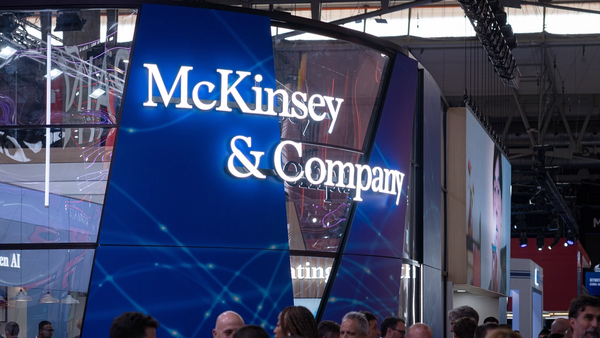The Good Old Days of Tech Are Over
Toxic culture and layoffs have soured morale

Employee sentiment in the tech industry has eroded significantly since early 2021. The sharpest drop has occurred in how employees rate company culture and values—more than compensation or work-life balance. Employee narratives focus more and more on toxic work culture and instability.
The observed sentiment drop mirrors macro shifts in the tech labor market: layoffs, cost-cutting, declining equity values, and return-to-office (RTO) mandates.
Entry and mid-level employees report the steepest declines in satisfaction, suggesting that younger and less established workers are bearing the brunt of the post-boom reset.
Over the past three years, the tech labor market has undergone a dramatic shift. After years of rapid growth and lavish perks, the post-pandemic correction hit hard: Over 400,000 jobs were cut across big names like Meta, Amazon, and Google. By 2024, the era of kombucha taps and unlimited PTO had given way to "hardcore" work expectations and return-to-office mandates. While hiring has since rebounded in select pockets, sentiment hasn’t recovered. Our recent newsletter highlighted what employees value the most in the workplace. This week, we take a closer look at shifting perceptions of company culture and workplace satisfaction among workers in tech after waves of layoffs in 2022 and 2023. What’s the mood inside tech firms now and what are workers saying?
While employees across all industries now rank their companies lower than they did in 2021, sentiment among those in tech declined far more sharply and persistently. From 2021 through early 2023, workers in tech consistently rated their companies more positively than workers in non-tech sectors, reflecting tech’s historic edge in compensation, perks, and workplace flexibility. But by early 2023, that advantage had faded.
Tech sentiment dipped below non-tech and has remained lower since, with the gap widening through 2024. This crossover marks a turning point: Tech, once viewed as the gold standard for employee experience, is now seeing greater dissatisfaction than other industries. By early 2025, sentiment in tech had dropped by almost 7%, compared to 4% in non-tech sectors. Tech sentiment reached its lowest point in early 2024, shortly after a second wave of layoffs and RTO crackdowns hit the industry. Although there has been a slight rebound since then, overall sentiment remains significantly depressed, underscoring the emotional toll that the post-2021 tech reset has taken on its workforce.

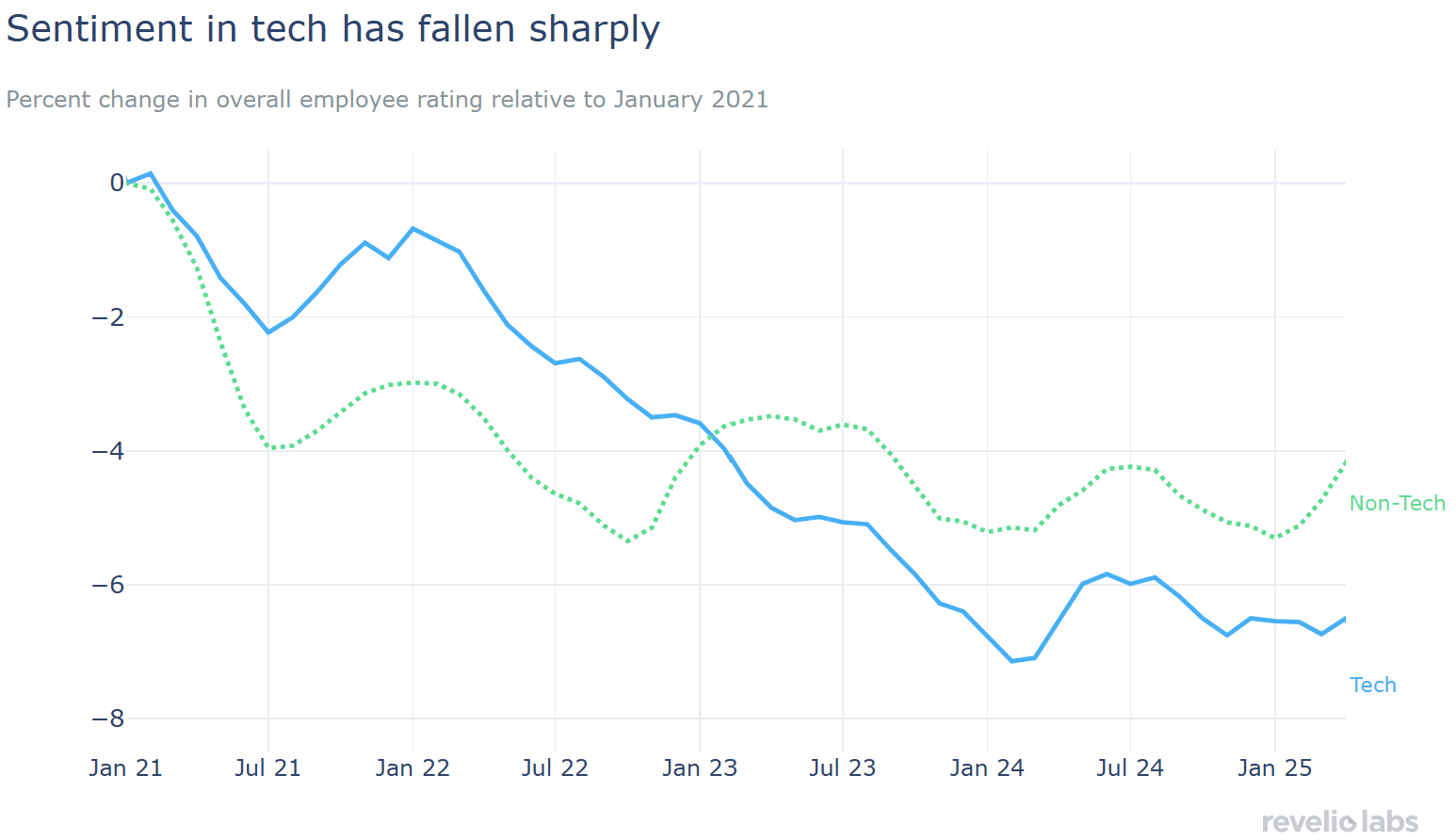
Which aspects of the workplace were most affected? Breaking down the sentiment ratings, workplace culture and values saw the steepest drop, with a 6.8% decline in ratings. Compensation, while commonly a point of contention during restructuring, saw a relatively smaller decline of 4.6%. Ratings for diversity and inclusion also declined by 3.9%, reflecting concerns about equity, transparency, and possibly the rollback of DEI initiatives in a tighter economic climate. Work-life balance, once a point of pride in the tech sector, declined by 2.6%, likely influenced by aggressive return-to-office policies and increased workload expectations. While material factors like pay remain important, the emotional and cultural contract between employers and workers has taken the hardest hit. Workers in tech are not just worried about their paychecks—they’re questioning what their companies stand for.

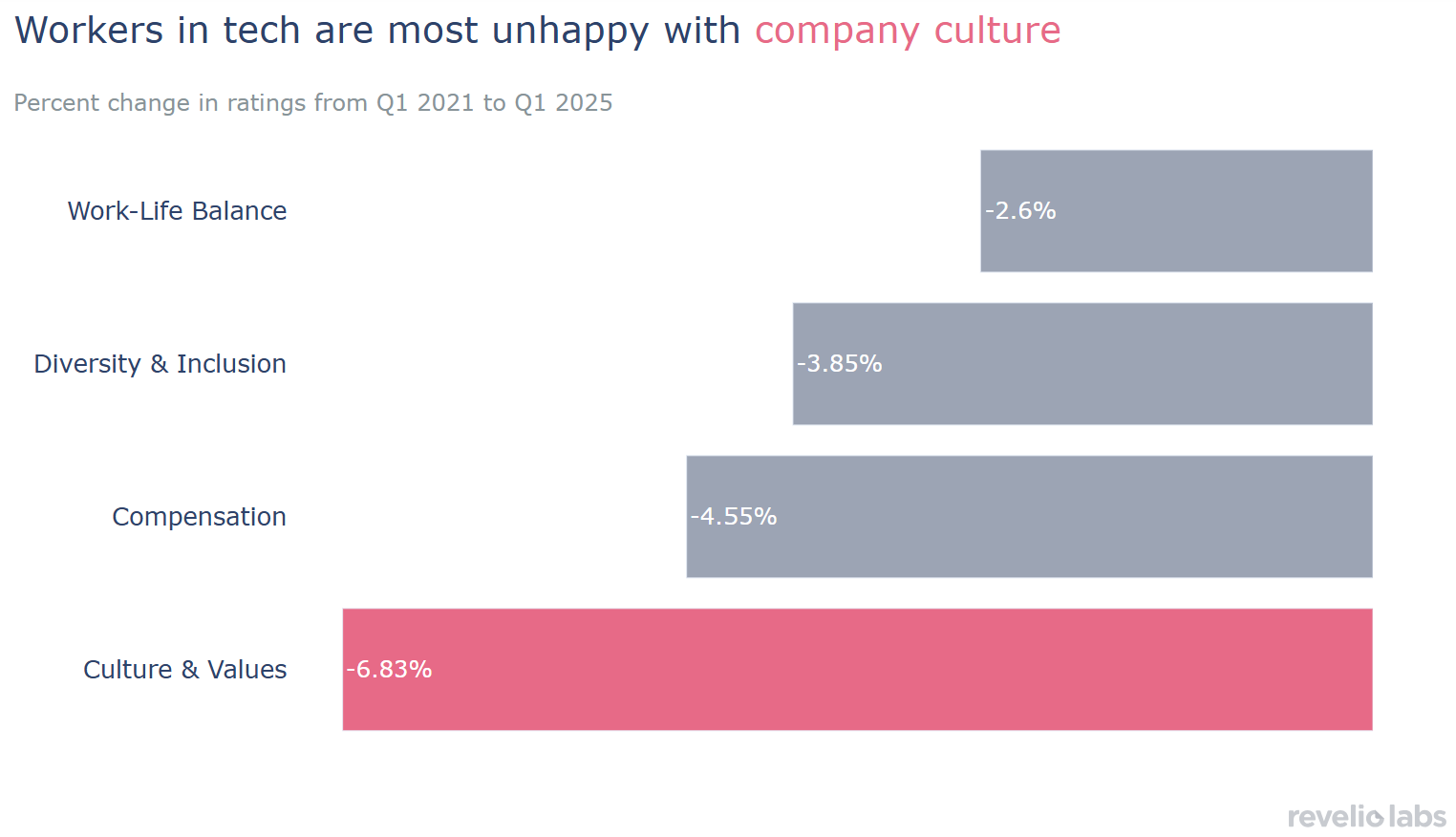
This growing dissatisfaction is echoed in employee language. Mentions of layoffs and instability surged by an astonishing 135.2% between Q1 2021 and Q1 2025, reflecting the sustained waves of job cuts and reorganizations that have reshaped the industry over the past three years. Beyond job security, the emotional tone of tech reviews has also shifted: Mentions of toxicity and hostility rose by 54.1%, as terms like “micromanagement,” “harassment,” and “bullying” became more frequent. Negative reviews related to remote work and RTO also grew by 33.4%, showing persistent tension over workplace flexibility and return-to-office mandates.

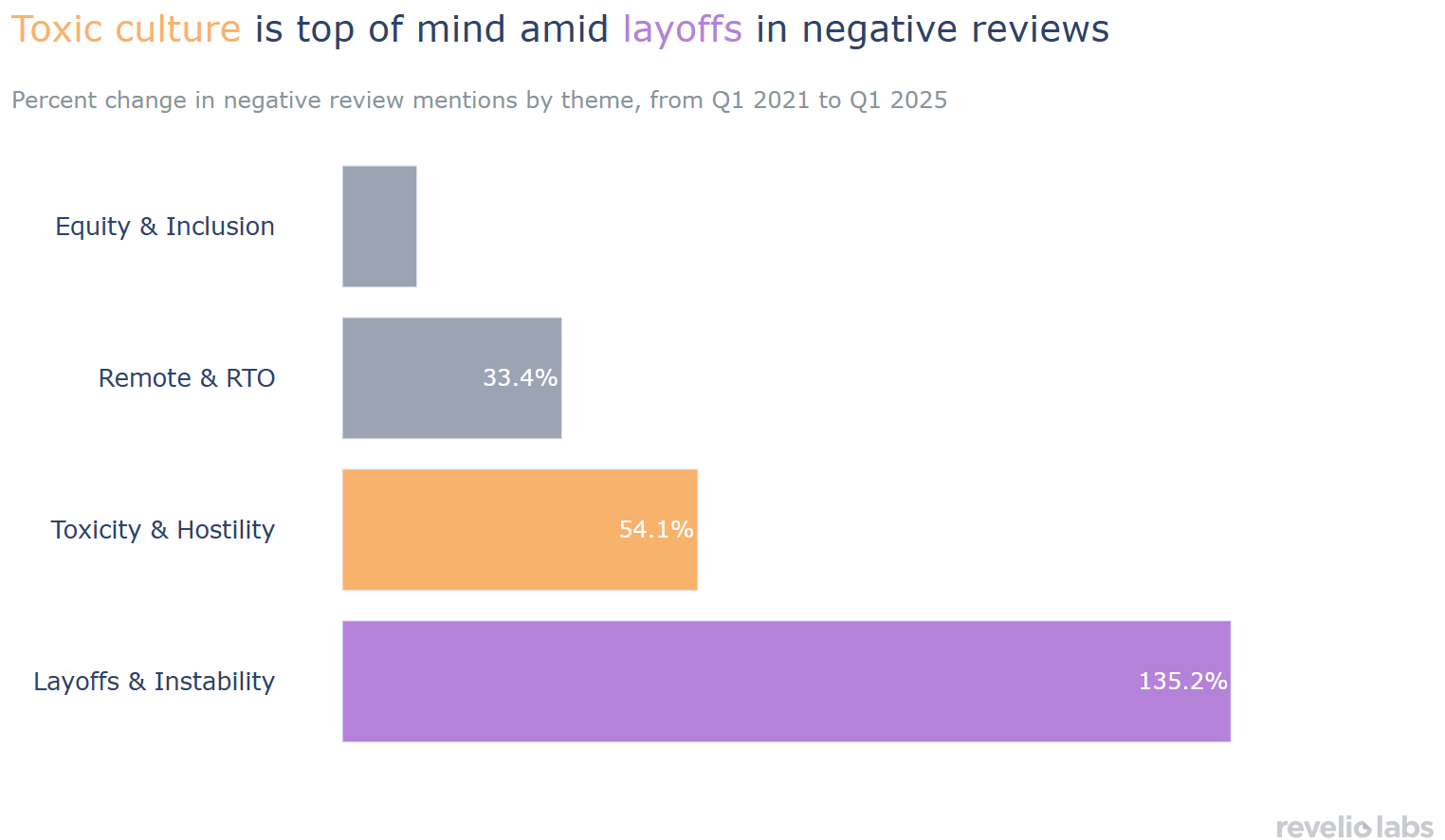
Some employees are feeling the discontent more sharply than the others depending on their seniority in the organization. Average ratings among entry-level employees have dropped by 6.5%, and mid-level staff aren’t far behind with a 6.3% decline. In contrast, senior-level workers have experienced a less dramatic decline of 2.8%. As tech companies adopt new ways of working and use more AI, the structure of tech organizations is changing. The steeper decline among less senior workers may reflect growing dissatisfaction with career progression, workload, or workplace culture as a result of this shift in broader industry conditions. With fewer layers of management and AI handling more coordination tasks, traditional mid-level roles are thinning. At the same time, entry-level workers are adjusting to hybrid work, less hands-on training, and a more fragmented onboarding experience in remote teams.

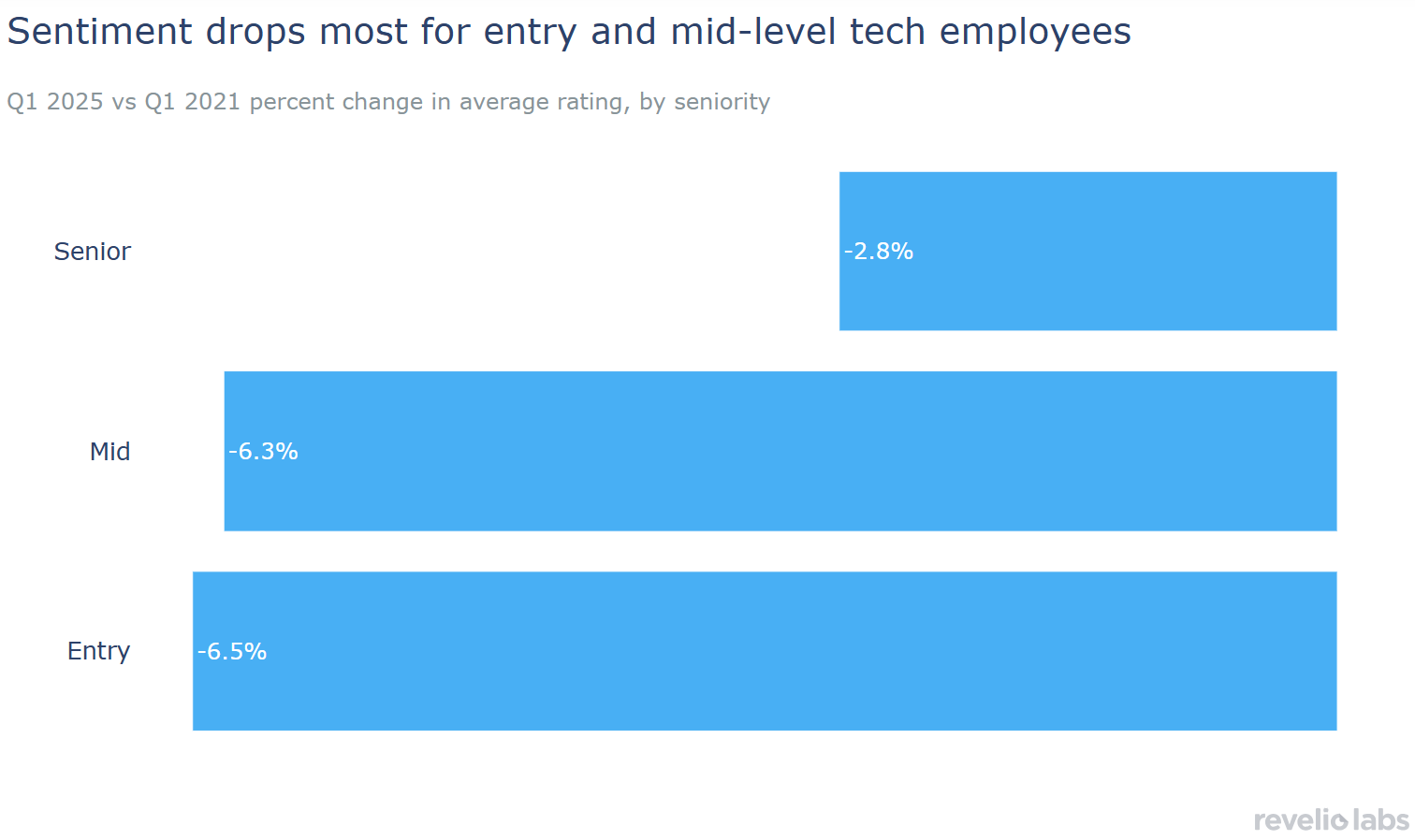
As the labor market cools and hiring slows, employers may assume that retention is no longer a top concern. But declining sentiment is not just a lagging indicator—it’s a predictive one. Past Revelio Labs’ research shows that toxic work culture often precedes attrition. Dissatisfied entry-level employees today are mid-career flight risks tomorrow. Fixing sentiment isn't just about perks. It requires structural commitment to equity, transparency, and sustainable workload. Tech may have shed the excesses of its pre-2022 boom, but the real test lies ahead: rebuilding trust in a leaner, more skeptical workforce.

